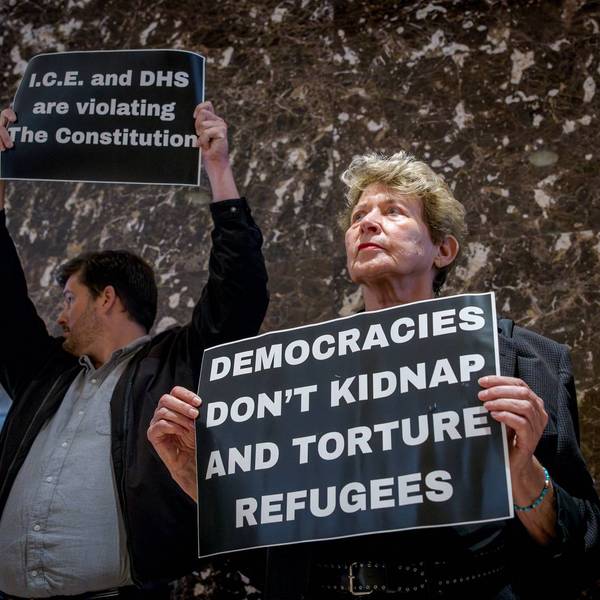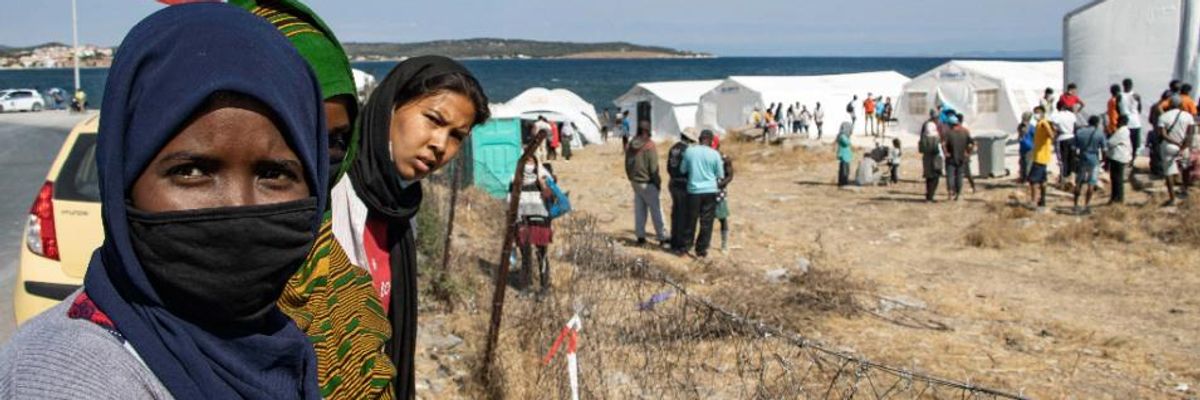Reneging on his earlier promise to raise the refugee admissions cap to 62,500 this fiscal year, President Joe Biden on Friday signed a directive keeping in place the historically low 15,000-person limit imposed by the Trump administration--a decision that sparked furious backlash from human rights campaigners.
"There is no moral reason to keep the historic-low refugee admissions goal of 15,000 in place for the rest of this year, nor was there any morality in the significant delay in restoring regional allocations."
--Meredith Owen, Church World Service
"This is utterly unacceptable and shameful," wrote Stephen Miles, executive director of Win Without War. "The president should immediately reverse this decision."
Joanne Lin, national director of advocacy and government relations at Amnesty International USA, said in a statement that "Biden is turning his back on tens of thousands of refugees around the world who have been approved to come to the United States."
While leaving the Trump-era cap in effect, Biden's directive adjusts allocation limits to "provide more slots for refugees from Africa, the Middle East, and Central America and lift Trump's restrictions on resettlements from Somalia, Syria, and Yemen," the Associated Press reported.
"The Biden administration has given no explanation as to why the president has kept the refugee admissions cap," the AP added.
The International Rescue Committee (IRC), a global humanitarian aid group, said the president's move "represents a disturbing and unjustified retreat from the 62,500 level announced by the Biden administration in February, that number itself a staging post en route to the campaign commitment of 125,000 refugees."
"With more than 35,000 refugees who have passed security clearances and over 100,000 waiting in the pipeline for years to be reunited, a refugee admissions goal of 15,000 leaves thousands of people in limbo and in need of safety," the group continued. "IRC has already warned that at the current rate of admissions, President Biden is on track to resettle the lowest number of refugees of any president in U.S. history, all while U.S. communities, state and local governments, and resettlement agencies are ready to welcome refugees."
Facing a flood of outrage from lawmakers and advocacy groups, the White House issued a statement later Friday announcing that Biden will "set a final, increased refugee cap for the remainder of this fiscal year by May 15"--but indicated that the president's "initial goal of 62,500 seems unlikely."
"As a candidate, Biden promised humanity and relief for refugees fleeing persecution," the ACLU tweeted in response to the White House's statement. "We will be watching to see if President Biden fulfills his promises."
Biden's directive Friday closely followed reports that the president was worried about the "political optics" of raising the refugee cap at a time when U.S.-Mexico border crossings are increasing, prompting xenophobic hysteria from the right.
An unnamed senior Biden administration official told the New York Times Friday that the White House "grew concerned that the surge of border crossings by unaccompanied minors was too much and had already overwhelmed the refugee branch of the Department of Health and Human Services."
"But migrants at the border seeking asylum are processed in an entirely separate system than refugees fleeing persecution overseas," the Times noted.
The National Immigration Forum echoed that point on Twitter, declaring, "Refugee resettlement has absolutely nothing to do with what's going on at the border."
"Refugee resettlement is not about about 'optics' or politics--it's about a commitment to protecting the most vulnerable."
--National Immigration Forum
"Refugee resettlement is not about about 'optics' or politics--it's about a commitment to protecting the most vulnerable," the group added.
Biden's directive came shortly after a group of more than 30 House Democrats sent a letter Friday morning urging him to follow through on his February vow to raise the refugee admissions cap to 62,500 this fiscal year. Biden has also pledged to raise the admissions cap to 125,000 by Fiscal Year 2022, which begins in October.
The president's foot-dragging on the issue has left thousands of refugees in a state of uncertainty, including many who have already been vetted by the U.S. government.
"Mark Hetfield, the president and CEO of HIAS, a refugee resettlement organization, shared the story of one nearly 30-year-old Congolese woman who had been vetted and approved to fly to the U.S. in early March," CNN reported Thursday. "When Biden's signature didn't come, her ticket was canceled, and because she is now in her third trimester, she can no longer travel."
Rep. Ilhan Omar (D-Minn.), one of the signatories of the Democratic letter, called Biden's decision to keep the Trump-era cap in effect "shameful."
"As a refugee," said Omar, who was born in Somalia, "I know finding a home is a matter of life or death for children around the world."
Meredith Owen, director of policy and advocacy for Church World Service, a refugee assistance organization, said in a statement that "there is no moral reason to keep the historic-low refugee admissions goal of 15,000 in place for the rest of this year, nor was there any morality in the significant delay in restoring regional allocations."
"The harm caused by the delay cannot be overstated--thousands of refugees who were ready for travel to the United States last month have seen their medical and security checks start to expire," said Owen. "This means that they will have to wait months--if not years--to actually be resettled in the United States and reunited with loved ones."
This article has been updated with a new statement from the White House.




